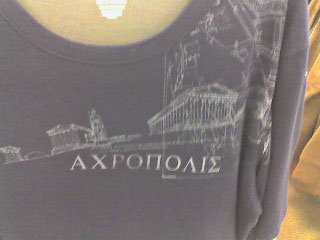The pretense of a classical education
Quoth Alan Rickman as Hans Gruber in Die Hard,
'When Alexander saw the breadth of his domain, he wept for there were no more worlds to conquer.' Benefits of a classical education.Hans clearly presents this as a quotation, presumably from a classical source, but there seems to be no real antiquity to it. At least not in that form. It may be a distortion of a passage in Plutarch, as the page linked suggests, a suspicion I had come to just before reading that page. Plutarch had actually said that Alexander wept upon hearing that there were infinite worlds, realizing that he had not yet conquered even one of them.
The mistake is easy enough to understand. A) Everybody knows that Alexander conquered the world, B) we hear that Alexander wept ... hm ... something about other worlds ... ah-ha! C) Alexander wept when he realized there were no other worlds to conquer!
Variations on the theme crop up throughout 19th century works in much the same form as today, namely as vague references to something we all just know to be true. One book review I found from 1842 uses a slight variant and justifies itself by saying, 'the books tell us,' suggesting that it was already a commonplace:
Alexander wept for other worlds to conquer, the books tell us, because, forsooth, he had marched with an army in one direction through countries whose utmost extent was about two-thirds that of the United States.This is clearly drawn from the passage in Plutarch referred to above, though through some intermediate source that has blurred the original and offered the wrong context. (Incidentally, the review in which this crops up is for a work of alternate history by Louis Geoffroy, apparently one of the first of its kind.)
Even before this and for long after it was a commonplace in English grammar and composition books. Searches like those I performed with Google Print show wild variations more than a century and a half ago, indicating that this non-classical quotation was, even then, used by those professing a classical education, doubtless unchecked by others eager to maintain the same pretense.
It's clear in their contexts that earlier writers such as Calvin and Molière understood the original, but the repetition of an obscure quotation seems, in this case, like a particularly romantic game of telephone.
In fact, I wonder now if a misreading of Calvin wasn't the original culprit. Calvin used the reference in his interpretation of Psalm 146 ('3. Trust not in princes; in the son of man in whom there is not safety. 4. His breath shall go forth; he shall return to his earth, in that day his thoughts [285] shall perish.'):
When he says that in that day all his thoughts perish, or flow away, perhaps under this expression he censures the madness of princes in setting no bounds to their hopes and desires, and scaling the very heavens in their ambition, like the insane Alexander of Macedon, who, upon hearing that there were other worlds, wept that he had not yet conquered one, although soon after the funeral urn sufficed him.That Calvin juxtaposed this event closely with Alexander's death (which I'm not sure Plutarch hints at) made it easier to confuse conquering no world with conquering this world, a feat acknowledged by all for Alexander, who died young.






